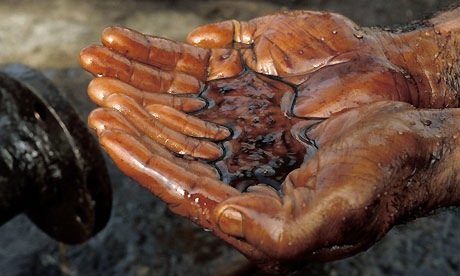[captionpix align=”left” theme=”elegant” width=”320″ imgsrc=” http://static.guim.co.uk/sys-images/Guardian/Pix/pictures/2009/8/25/1251240543030/uganda-oil-001.jpg” captiontext=”Fishermen near an oil rig on the edge of Lake Albert (Photo: The Guardian)”]
When oil was first discovered in 2006, Ugandans were full of hope. Many believed the discovery of this valuable natural resource would provide desperately needed revenue for this east African nation in which a quarter of the population lives below the poverty line. The discovery of more than two billion barrels of oil, once extracted, could put Uganda on the list of the largest oil exporting countries in Africa. Why is this seemingly good news now a cause for such concern among observers both within and outside the country?
The problem in Uganda begins with a phenomenon commonly referred to as the resource curse. Many of the world’s poorest nations also happen to be home to large reserves of some of the world’s most valuable natural resources. High levels of natural resources in general, and oil in particular, have been associated with an increased propensity towards violent conflict, rampant corruption, weak institutions, slow economic growth and poverty. Many of Africa’s resource ‘cursed’ states tend to fare far worse than their resource poor neighbours.
Is Uganda the Next Nigeria?
Nigeria is a telling example of the impact that vast oil revenues in the hands of a weak, corrupt government can have on a state. The West African state is believed to have earned somewhere in the neighbourhood of US$350 billion since it began exporting oil in the early 1970s. These massive oil revenues have failed to translate into better standards of living for the average Nigerian, as the percentage of the population living below the poverty line has more than doubled since the discovery of oil, and GDP per capita, when adjusted for inflation, has not risen in the past 40 years.
The relationship between oil and conflict plays out in multiple theatres in Nigeria, fuelling violent ethnic competition over access to or control of the vast amount of oil rents available to those in power. The return to civilian rule in 1999 has been marked by increasingly violent competition over access to state wealth and power. Nowhere is this more evident than in the oil-producing region itself, the Niger Delta. Despite the fact that almost 100% of Nigeria’s current oil exports come from this region, its poverty and unemployment levels are even worse than the dismal record throughout the rest of the country. Many believe that Nigeria is now on its way to becoming one of the worlds next failed states.
What Can Be Done?
The international community has failed to come up with an effective way to help states combat the resource curse, though this doesn’t mean there haven’t been attempts. The Publish What You Pay campaign which began in 2002 proposes that governments adopt legislation that makes it mandatory for publicly listed oil and mineral companies to disclose information regarding their payments to governments if they want to be listed in the stock exchange. The logic behind this initiative is that it is difficult for a population to hold their government accountable when they are unaware of how much the government is receiving in revenues. Transparency is important, but ultimately serves little purpose if it doesn’t exist in an environment that allows for an open, productive conversation to take place about what transparency is revealing.
Initiatives have also focused on helping states become better managers of their natural resource wealth. Developed with the assistance of the World Bank, the Chad-Cameroon Petroleum Development and Pipeline Project remains one of a kind in terms of its attempt to translate oil wealth into poverty reduction through multiple targeted policy initiatives. The project was approved in 2000, but ultimately failed in 2008 when the World Bank removed its support, declaring that government of Chad had failed to follow key requirements and was not properly allocating resources for poverty reduction.
The total failure to date of all international efforts designed to make states better managers of their natural resource wealth begs the question: is the easiest solution perhaps the hardest of all? Uganda’s financial backers could do something—stop supporting the development of the oil industry in the country. This may seem extreme, but until there is a viable way of helping states avoid the resource curse, it may be the only solution.
Unfortunately for the citizens of Uganda, this is not likely to happen any time soon. Even if American, British, or Canadian oil companies were to leave Uganda alone, they would soon be replaced by their Chinese, Indian, or Russian counterparts. The importance of oil means that countries are willing to overlook shortcomings of regimes—whether they are human rights abusers or corrupt thieves—when they are sitting on a significant source of oil. The recent deployment of 100 US military advisers to Uganda has many wondering what the true motive behind the move is. Many believe that Washington is motivated by its interest in Uganda’s oil, seeing intervention now as a sort of ‘down payment’ for the future. The US denies these accusations, stating that they only seek to help eliminate the Lord’s Resistance Army, which it has defined as a terrorist group—an excuse many are finding difficult to believe.
All Signs Pointing to Trouble
Uganda is heading down a scary path, with evidence of the resource curse already beginning to materialize within the country. Ordinary citizens and civil society groups alike have begun to speak out about the lack of transparency surrounding the oil transactions currently being carried out by the government and how the money is being put to use. Reports of bribery, corruption and mismanagement are already widespread and oil production has yet to even begin. Those living in the soon to be oil-producing western region have begun to fear for their livelihoods, with an estimated 30,000 expected to be displaced in order to make room for Uganda’s first oil refinery. Citizens are worried they will not be adequately compensated for their loss of land, of which many of them are entirely reliant for their livelihoods and income.
Those who could do something about the problem, namely the Ugandan government and foreign oil companies, clearly lack the political will to do so because they are the ones who will reap the benefits when the oil begins to flow. Citizens can—and should—continue to call for transparency and full disclosure of the government’s transactions relating to oil production. But will this be enough?



